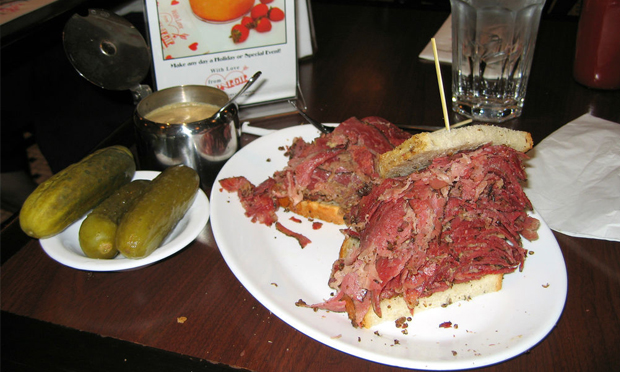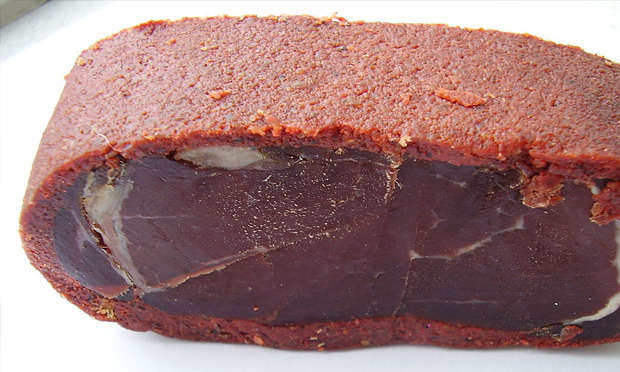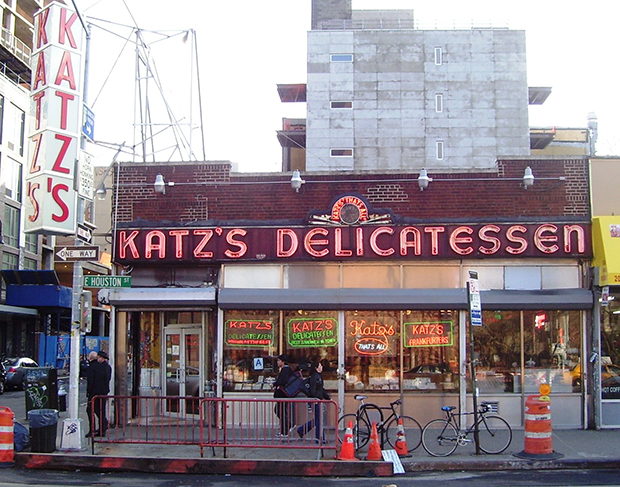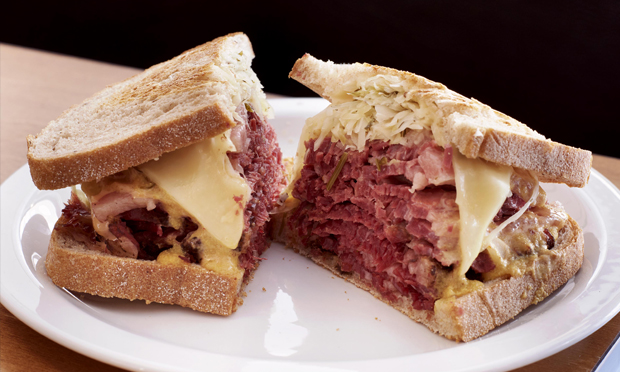Gillian Riley on food: Why pastrami? The answer is blowing in the wind

A rather packed pastrami sandwich, with complimentary pickles. Photograph: Charles Haynes via Flickr
To the question ‘Why on earth should London think it needs a New York style Jewish Deli?’ the answer is literally blowing in the wind: with the fragrance of cumin, fenugreek and paprika from Hackney’s Turkish basturma, the whiff of fresh baked bagels and mustard in Brick Lane, the spicy fumes of home-cooked pastrami in Hoxton Street, and the tang of sauerkraut and herring in even the most hygienic of kosher food stores in Stamford Hill.
The answer is complex, perhaps one aspect is personified in our irrepressible Roman legionary, back in Blighty after a tour of duty in Armenia, where he had picked up some lumps of salted, wind-dried, highly spiced beef to add to the immortal hard tack and fish sauce in his kit.
Centuries
This way of preserving meat had been known for centuries in Armenia, and far from being a Jewish speciality, it was widespread among the different races and cultures of the Middle East. It works with prime cuts, eaten raw, sliced thin, or with fatty chunks of tough meat that needed long slow cooking with the tenderising effect of spices, served cut coarse and thick with sharp fruity pickles to mitigate the richness.
This take on salt beef is similar to the story of the multi-racial bagel scene in Hackney [East End Review, 17 June 2014] where we can get an overview of the great ring-bread family, from the Jewish bagel to the Turkish simit, with our jam doughnuts thrown in to confuse the issue.
Maybe our legionary might have deviated along Whitechapel Road to the late Blooms, facing up to the rude waiters with centurian-proof chutzpa, for a takeaway of salt beef and saurkraut, before he trudged north up Kingsland Road, little knowing that at the far end of Ridley Road, the Turkish Food Centre, has London’s finest selection of basturma, equalled only by that of Akdeniz further up on the right and the Egg Stores in Stamford Hill.

Basturma from Armenia. Photograph: Wikimedia Commons
This tasty spiced beef is the equivalent of bacon for cultures who don’t eat pig: the Egyptian breakfast of eggs fried in butter or oil, and eaten with a few slices of basturma heated through in the pan, is classic. If our friend thought he would miss the cured and boiled meats of generations of immigrants, offered with sinister brusqueness at the now defunct Schmidt’s in Charlotte Street, he was wrong, for the Iron Age natives of Occupied Britain already had a tradition of extracting salt from sea water and, with the help of Roman technology, preserving cuts from mature beef cattle.
Zooarchaeologists can ‘read’ the knife marks on bones found in kitchens and middens, which tell us all about how an animal was killed, butchered and cooked, and in some cases preserved. Some big cattle bones indicate that beef was salted and hung up to dry. Sounds familiar? And before that the Stone Age Shetland Isles, under Viking influence, were producing the tough, chewy, wind dried or smoked reestid mutton, still enjoyed today.
Delis
But London then and now has nothing like the conditions in which the New York Jewish deli flourished, product of a unique city with a unique immigrant intake. What with the work ethic, the overcrowding, the noise and bustle day and night, the need to rush, yet also sit and gossip, a deli combined the solidarity of the synagogue with the banter and comfort of home.
To many of us this has an exotic whiff of otherness. We cool happy-clappy Hoxton hipsters, (not excluding the odd octogenarian Yorkshire atheist), feel familiar with New York’s Katz’s and Zabar’s, whilst lamenting the (we hope) temporary departure of Mishkin’s from Covent Garden, are lapping up the genuine home cooking of Monty’s, where everything is made in house, from the pastrami to the bagels, the slaw to the pickled gherkins.

Katz’s Delicatessen, New York. Photograph: Wikimedia Commons
There used to be an urban myth about an austere restaurant reviewer who once scrupulously graded the salt beef in the many New York delis, awarding marks for different qualities, only to find that they all of them bought the stuff in from the same wholesale producer.
This can happen in London, where both factory made bagels and beef can be of poor quality. An establishment I will not name, that offers 24 hours of disappointment, has huge slabs of a greyish, gluey beef that might be the recovered corpse of a long dead dinosaur oozing from some fetid permafrost, served in a soggy bun. Avoid it.
But the salt beef and bagel scene in Hackney is varied and well worth exploring.
The American immigrant’s aspiration for life, liberty and the pursuit of happiness could well have been summed up as ‘LOTS OF MEAT’. The half-starved Calabrian peasant, or the persecuted Polish wage slave, might have been lucky in the Old Country to have meat two or three times a year, as part of a festive meal, but in New York he could have as many meatballs as he could eat with his spaghetti twice daily.
It makes the song ‘One Meat Ball’ all the more poignant, hummed by well fed third and fourth generation immigrants with no experience of hardship, alongside the warbling of the Andrews Sisters in the 1944 version, a reminder of the archetypal Little Man who had only 15 cents to spend on a meal: ‘One meat ball, one meat ball / Well, you gets no bread [or spaghetti] with one meat ball…’
The lyrics were written in the 1850s by George Martin Lane, later a distinguished professor of Latin, and was a sort of college in-joke, based on his experience as an impoverished student, with only 15 cents for his ‘Lone Fish Ball’. But the song, with its elusive promise of plenty, a reminder of a harsher reality, has resonances beyond a Harvard elite, so it kept being revised and revived, inspiring the Beatles, Tin Pan Alley and the early American folk music movement (even rap/reggae crossover artist Shinehead has had a crack at the tune.)
Reuben
It’s not often I wriggle away from food history controversies, but heated words about the origins of the Reuben, where it was invented and by whom – maybe Reuben Kulakofsky in Omaha, Nebraska in the 1920s, or back home in Reuben’s Deli in New York around 1914 – seem to matter less than its power as a symbol or icon.
The ‘lots of meat’ aspiration found its ultimate expression in the Reuben, a terrible towering mass of incompatible ingredients, each cancelling the other out in an improbable pile-up of lush cholesterol and manic seasonings, joyfully ticking all the boxes in my Mucky Eating zone.
Thickly cut pastrami and salt beef, layered with coleslaw or sauerkraut, gloopy Russian dressing, topped with a layer of fatty Swiss cheese, oozing into the soft bread as it crisps up when fried in butter or grilled, then congeals more or less gracefully. This might well be one plausible realisation of the American Dream.

The Reuben at Monty’s Deli, Hoxton. Photograph: Fraser Communications
Hackney Citizens can also flock to The Good Egg in Stoke Newington Church Street and pig out on a version of the Reuben on the Montreal/Tel Aviv/Jerusalem axis, where dry-cured beef ribs (instead of wet-cured salt beef and brisket) have a very different texture and flavour – linking the Reuben with its ancient Middle Eastern ancestry.
We can stagger from the soft, warm, blowsy but piquant maternal embrace of the New York Reuben to the skittish charms of the dissolute maiden aunt that is the Montreal version, with its crisp salty smoky spiced filling crammed into pitta bread soaked wantonly in spiced butter and grilled to a crackling shell.
The beef ribs, a different cut from brisket, are salted then lavishly spiced and dry cured with some heat for three or four days, and cooked sous vide for a long time, and emerge in parts chewy, not raw but bright red from the cure, with the outside fattier parts crisp and crunchy. The accompanying sauerkraut and smoked Cheddar cheese add to the pungency of the mix, with the additional salty, but not sharp or sweet, home-cured gherkins served on the side.
The Montreal Reuben is not an innovation, it has a history as long and inconclusive as that of the New York Reuben, and the Romanian immigrant butcher, Aaron Krantz, or maybe an unknown Ukrainian, who fed customers in the 1890s with traditionally prepared smoked meats, emerge along with many dubious contenders from the painstaking researches of archivist Eiran Harris.
Read our review of Monty’s Deli’s new Shabbat dinner next week…
